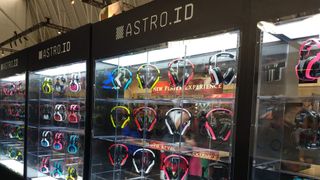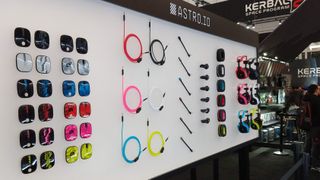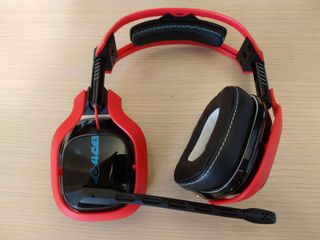Astro ID let me build the gaming headset of my dreams
Astro ID is a colorful way to build a gaming headset

BOSTON – On the one hand, Astro ID is all about aesthetics. On the other hand, it's perhaps the deepest level of customization I've ever seen in a gaming headset. That's because you don't simply buy an Astro ID headset and tweak it after the fact; you get to design it from scratch. To demonstrate how the system worked, Astro put together a custom headset for me on the PAX East show floor, and there's a very good chance that no one else on Earth will design quite the same one.
I met with a rep from Astro right behind a gigantic row of display cases. Each case contained about a dozen Astro A40 headsets. But unlike traditional A40s, which are either black or white with, perhaps, some colorful tags on the earcups, no two of these colorful headsets was alike. Some of them had red or blue chassis; some of them had pink microphones or yellow headbands. Most of them were absolutely gorgeous, and quite unlike the standard solid black gaming headset from most manufacturers.
- The best gaming headsets
- PS5: Release date, price, specs, games and more
- New report shows how Sony can overtake Xbox Series X

Astro ID design
At its core, Astro ID is a very simple idea: build your very own Astro A40 headset by filling out a card on a show floor — or, more likely, a form on a website. There are six different components that go into a headset: a frame, the ear cushions, the headband, the mic, the power cable and the earcup tags.
Each one of these pieces has six different color options: black, white, blue, red, pink and yellow. That means there are more than 90,000 possible combinations — more, if you're willing to buy custom tags, since they're compatible with any A40 device.
The increased customization comes with a price, however: $50, to be precise. While a regular pair of A40s will set you back $150, the Astro ID versions cost $200 instead. This is partially because of the labor that goes into putting them together, and partially because it's cheaper to mass-produce a single headset than a ton of different components.
However, Astro offsets this cost somewhat by including an official headset case with Astro ID models. This durable foam case usually retails for $20 by itself, so you could argue that the Astro ID is only $30 more expensive than its simpler cousin.
The satisfaction of having your very own colorful headset may be worth the extra money, although it's worth noting that there's nothing mechanically different between an Astro ID and an Astro A40.

Astro ID performance
We've reviewed a few different Astro A40 models before, and it's been one of the most consistent gaming headsets on the market for more than ten years. The design hasn't really changed because it hasn't really needed to change. It's durable; it sounds great; it works well for both music and games.
In a way, the Astro ID seems like the only logical evolution of the Astro A40. When there's nothing wrong with a product's performance, the only thing to address is its appearance.
And there's now an A40 appearance out there to suit just about any kind of player. (I personally would have liked some green highlights as well, but I admit, that color might not mesh well with the device's clean, industrial appearance).
You can design your own Astro ID headset on the company's website. Just keep in mind that your peripheral will take about two weeks to ship, rather than the standard handful of days. When it comes to your personal style, somethings are worth waiting for.
Sign up to get the BEST of Tom’s Guide direct to your inbox.
Upgrade your life with a daily dose of the biggest tech news, lifestyle hacks and our curated analysis. Be the first to know about cutting-edge gadgets and the hottest deals.
Marshall Honorof is a senior editor for Tom's Guide, overseeing the site's coverage of gaming hardware and software. He comes from a science writing background, having studied paleomammalogy, biological anthropology, and the history of science and technology. After hours, you can find him practicing taekwondo or doing deep dives on classic sci-fi.

